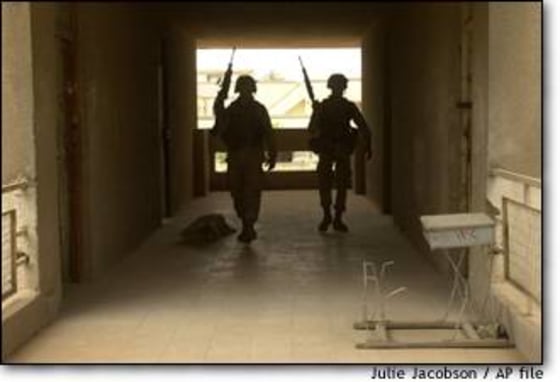They’re cleaning up from the war here, and bracing for the peace. Since the statue of Saddam Hussein was hauled down in front of the Palestine Hotel, it has been wall-to-wall chaos in Baghdad. But slowly, the voices of ordinary Iraqis are being heard — and what they are saying may not always please Americans.
Not so long ago, hospital staffers chased looters down the street and engaged in AK-47 firefights while journalists ducked for cover. Whole shopping centers and government buildings were on fire, ravaged by the looters and then torched.
Late one afternoon, I stood on the roof of our hotel and counted no fewer than 13 huge fires sending thick smoke into the dusk. The buildings would burn to the ground because there was no functioning fire department — or police department or bus service or electricity or water or traffic control, or order of any sort.
There were also fires that burned for a shorter time because they were triggered not by looters and their primitive incendiary agents, but by violent explosions of the unbelievable stores of munitions that Saddam’s defenders had loaded into dozens of schools and private homes in residential neighborhoods.
One homeowner in the B’nog neighborhood — the banking district, with homes for more than 100,000 middle-class residents — said he and his family and about a dozen of their neighbors had been ordered out of their houses by Saddam’s Republican Guard “around the end of the first week of the war.” When he felt it was safe to return, a week after the statue of Saddam was hauled down, he found his home filled floor to ceiling with tank and artillery shells, landmines, grenades and countless cases of 7.62 ammunition.
There were no fewer than 15 Frog missiles parked around his neighborhood, their long and lethal yellow shapes an inviting target that U.S. warplanes chose to ignore.
We were interviewing the man because three hours earlier one of his neighbor’s homes had blown up — no one knew why or how, exactly — and had taken four other homes with it. A frantic doctor tending patients in a nearby mosque-turned-emergency room estimated that 30 people were injured, 10 critically — and surely some dead were still beneath the rubble.
The man we were interviewing said he’d hired a truck and some men to haul the explosives out of his house, “just to take it out of here, away from us. The U.S. military won’t do it, at least not fast enough.”
The truck came, the hired men stepping carefully around the thousands of live shells the explosions had sent flying around the neighborhood.
The homeowner shook his head, angry at Saddam’s men for turning his neighbors into thousands of unsuspecting human shields. And angry at the United States for waging the war and then not cleaning up the mess that war created.
The man’s daughters, standing nearby, cried non-stop.
All over Baghdad we heard the newly raised voices of ordinary Iraqis who can now speak freely for the first time in decades.
Among them was that of Abdul Hafiz Jamel, an urbane 58-year-old civil engineer, who said he wasn’t worried about the lack of electricity and chaos in the streets — that’ll all work out, he said. But he was worried about the next few months.
“I cheer America now,” he said. “Saddam is gone, thank you very much. But soon you must go home, because if you don’t we will know you did not come for Saddam but for another reason” — our oil, he said, or control of our people. “The minute I know that,” he said, “I and all of us will become bombs against America.”
No bombs now, and even the bullets in the streets are flying less frequently. But postwar Baghdad is still a place fraught with dangers.
(NBC News correspondent Mike Taibbi is on assignment in Baghdad.)
